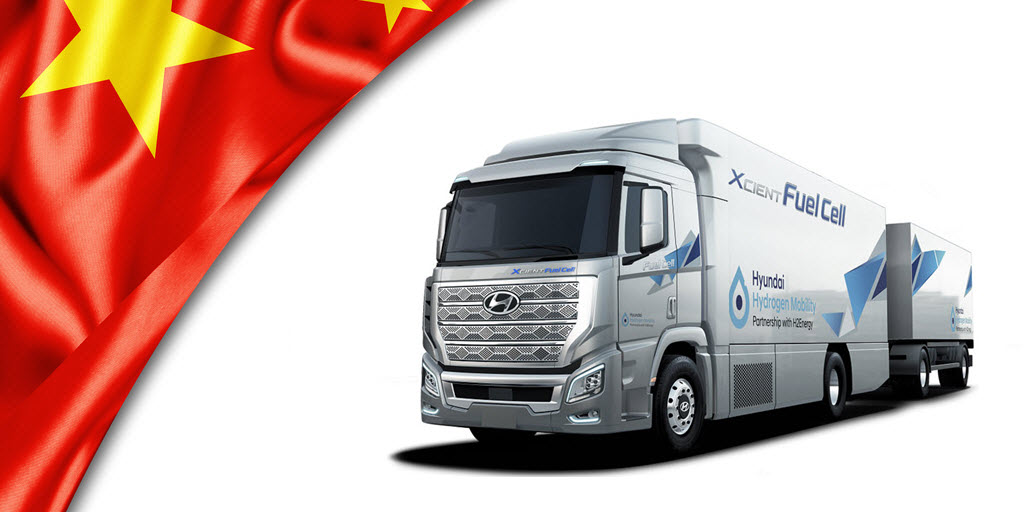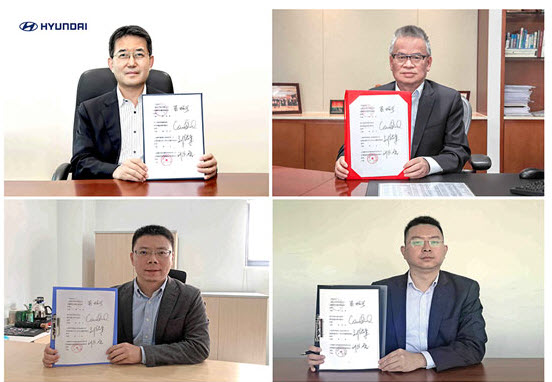
Hyundai Motor Company is preparing a foothold to enter the Chinese hydrogen-electric commercial vehicle market.
On the November 4th (Wed), Hyundai Motor Company has signed two MOUs with partners in the Yangtze River Delta region* and Jingjinji region with the aim of establishing a local hydrogen economy ecosystem in China.
Through this multilateral cooperation, Hyundai Motor Company plans to further solidify its position as a leading global hydrogen-electric commercial vehicle technology brand.
Within the Yangtze River Delta, which is the backbone of China’s economy, Hyundai Motors’ hydrogen-electric commercial vehicles are used to produce and supply hydrogen
- Build a hydrogen charging facility-Supply vehicles
- Build a hydrogen electric vehicle business platform that encompasses vehicle operation (finance) Each company will form a cooperation system that can be connected organically.
- It is also planning to promote a hydrogen-electric commercial vehicle pilot operation project.

To this end, Shanghai Electric Power has invested in the construction of a hydrogen charging station and promoted the construction of a green hydrogen production process using renewable energy (a method of electrolyzing water) and a hydrogen production project through IGCC (Integrated Gasification Combined Cycle).
Shanghai Soonhwa is in charge of construction and operation of hydrogen charging stations, comprehensive solutions related to hydrogen charging, and Convergence Department is planning to provide financial support services for a hydrogen-electric commercial vehicle pilot operation business.
Hyundai Motor Company will take on the role of supplying and operating vehicles to major logistics companies in the Yangtze River Delta region by distributing hydrogen-electric trucks and establishing a hydrogen-electric commercial vehicle operating company.
The four companies aim to cooperate to establish a low-cost/high-efficiency business model based on their respective expertise and to supply more than 3,000 hydrogen-electric trucks in the Yangtze River Delta area by 2025 through the continuous discovery of potential customers.
Also today, Hyundai Motor Company, together with the Chinese lecture group Antai Science and Technology Co., Ltd. (hereinafter referred to as Antai Science and Technology Co., Ltd. signed an additional MOU.

Jingjinji, China’s metropolitan area, is not only rich in by-product hydrogen production resources as large-scale steel companies are located, but demand for large trucks is increased due to the large volume of traffic in Tianjin and Tangshan. It has the best conditions for operating hydrogen-electric commercial vehicles.
In addition, the Tangshan City government is pushing ahead with a plan to build a hydrogen industry cluster with the goal of development of the hydrogen-electric vehicle industry focusing on large trucks, logistics vehicles, and urban maintenance vehicles, building a hydrogen supply infrastructure using by-product hydrogen and lowering the price of hydrogen.
Through this business agreement, Hyundai Motors will supply hydrogen-electric trucks suitable for market needs. Antai Sciences provides hydrogen storage, transportation, and charging related technologies and support for the construction of hydrogen charging stations. Heogang Industrial Technology supplies hydrogen using by-product hydrogen resources and it will be in charge of discovering the demand for the use of large-scale hydrogen-electric trucks.
The three companies plan to cooperate with the goal of promoting a pilot operation of hydrogen-electric heavy-duty trucks in the Jingjinji area and supplying 1,000 units of hydrogen-electric trucks by 2025.
“China is one of the markets with the greatest potential,” said Lee In-cheol, vice president of Hyundai Motors’ Commercial Business Division. “We plan to build a business cluster that spans the entire hydrogen ecosystem, including not only vehicle sales in the Chinese market, but also hydrogen car lease and charging station operation.”.
Meanwhile, Hyundai Motor Company has been promoting close cooperation with excellent local partners including the Chinese government to respond to the Chinese market, which is promoting the supply of 1 million hydrogen-electric vehicles by 2030, and aims to sell more than 27,000 units by 2030. It is actively developing hydrogen commercial business and building infrastructure.
Read the most up to date Fuel Cell and Hydrogen Industry news at FuelCellsWorks




